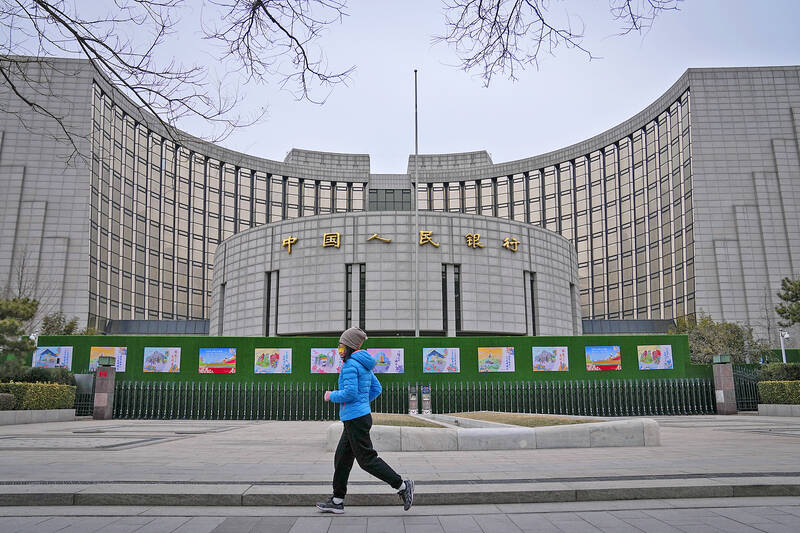China yesterday ramped up support for its property sector with its biggest-ever cut to a key mortgage reference rate, raising expectations for more aggressive measures to support the economy in the months to come.
Chinese lenders slashed their five-year loan prime rate (LPR) by 25 basis points to 3.95 percent, the People’s Bank of China said.
It was the first cut since June last year and the largest reduction since a revamp of the rate was rolled out in 2019.

Photo: AP
Lowering that rate will allow more cities in China to reduce minimum mortgage rates for homebuyers, which might stimulate sluggish demand for apartments as prices fall. The move shows an intensifying focus on measures to combat the property crisis, which has been a major drag on the world’s second-largest economy.
“It is delivering stronger dose of easing to the economy,” said Michelle Lam (林雪潔), an economist at Societe Generale SA.
The cut might reflect more support for mortgage demand and long-term corporate loans “while reducing risks of idle use of funds,” Lam said.
Banks also maintained their one-year LPR — the de facto benchmark lending rate — at 3.45 percent.
While expectations for a smaller reduction in the five-year LPR were fairly widespread, economists were split on a one-year LPR cut.
The move failed to impress investors.
China’s benchmark CSI 300 Index was down about 0.3 percent in morning trade. The offshore yuan gained 0.1 percent as the central bank set a strong daily reference rate, while the currency traded onshore was unchanged. Yields on China’s government bonds — which have been falling on greater bets for easing — slipped 1 basis point to 2.43 percent.
“A bigger cut may boost housing sentiment in the near-term, though this unlikely marks a turnaround in the property sector,” said Alex Loo, a macro strategist at TD Securities in Singapore.
Loo cited the China’s “urgency” to entice more homebuyers as property sales in key cities slumped during the week-long Lunar New Year holiday.
Next month is traditionally a peak season for home sales, making any efforts to spur more purchases all the more timely.
Even so, it was not clear whether the five-year LPR cut would offer much of a boost. The average rate of new mortgages granted in December last year had already fallen to a record low of 3.97 percent, while mega-cities such as Beijing, Shanghai and Guangzhou have been relaxing curbs on home purchases for months.
The cut will probably provide the most benefit for new homebuyers right now, as many existing mortgages — which were worth 38 trillion yuan (US$5.28 trillion) at the end of last year — are only repriced at the beginning of the year.
Several economists pointed to the need for additional easing this year — including through cuts to the central banks one-year policy loan rate, or the medium-term lending facility rate.
The People’s Bank of China refrained from lowering that rate on Sunday, making yesterday’s action the first time since May 2022 that the five-year LPR rate was cut following a hold on the medium-term lending facility rate.
The LPRs are based on the interest rates that 20 banks offer their best customers and are quoted as a spread over the central bank’s medium-term lending facility rate.
The central bank, which publishes the LPRs monthly, is seen as having significant sway over them.

Sweeping policy changes under US Secretary of Health and Human Services Robert F. Kennedy Jr are having a chilling effect on vaccine makers as anti-vaccine rhetoric has turned into concrete changes in inoculation schedules and recommendations, investors and executives said. The administration of US President Donald Trump has in the past year upended vaccine recommendations, with the country last month ending its longstanding guidance that all children receive inoculations against flu, hepatitis A and other diseases. The unprecedented changes have led to diminished vaccine usage, hurt the investment case for some biotechs, and created a drag that would likely dent revenues and

Macronix International Co (旺宏), the world’s biggest NOR flash memory supplier, yesterday said it would spend NT$22 billion (US$699.1 million) on capacity expansion this year to increase its production of mid-to-low-density memory chips as the world’s major memorychip suppliers are phasing out the market. The company said its planned capital expenditures are about 11 times higher than the NT$1.8 billion it spent on new facilities and equipment last year. A majority of this year’s outlay would be allocated to step up capacity of multi-level cell (MLC) NAND flash memory chips, which are used in embedded multimedia cards (eMMC), a managed

CULPRITS: Factors that affected the slip included falling global crude oil prices, wait-and-see consumer attitudes due to US tariffs and a different Lunar New Year holiday schedule Taiwan’s retail sales ended a nine-year growth streak last year, slipping 0.2 percent from a year earlier as uncertainty over US tariff policies affected demand for durable goods, data released on Friday by the Ministry of Economic Affairs showed. Last year’s retail sales totaled NT$4.84 trillion (US$153.27 billion), down about NT$9.5 billion, or 0.2 percent, from 2024. Despite the decline, the figure was still the second-highest annual sales total on record. Ministry statistics department deputy head Chen Yu-fang (陳玉芳) said sales of cars, motorcycles and related products, which accounted for 17.4 percent of total retail rales last year, fell NT$68.1 billion, or

In the wake of strong global demand for AI applications, Taiwan’s export-oriented economy accelerated with the composite index of economic indicators flashing the first “red” light in December for one year, indicating the economy is in booming mode, the National Development Council (NDC) said yesterday. Moreover, the index of leading indicators, which gauges the potential state of the economy over the next six months, also moved higher in December amid growing optimism over the outlook, the NDC said. In December, the index of economic indicators rose one point from a month earlier to 38, at the lower end of the “red” light.